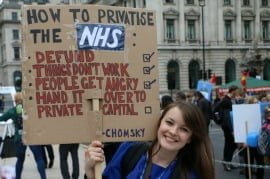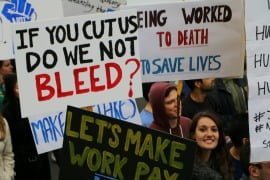Junior doctors have voted overwhelming in support of strike action, with 98% voting Yes to a full walk out. All of this on a 76% turnout – a vote for action that would smash even the Tories’ new anti-union laws. The scene is now set for a showdown between doctors and the government.
On Wednesday 18th November, junior doctors in England voted Yes to strike action. The scene is now set for a showdown between doctors and the Tory government.
In a letter to British Medical Association (BMA) members, Mark Porter, the BMA Council Chair outlined the results of the ballot:
This morning, we announced that junior doctors in England have voted overwhelmingly for industrial action, including a full walkout. This is an unprecedented decision and the most decisive outcome of any BMA ballot.
Over 76 per cent of junior doctors voted in the ballot, with 99.4 per cent voting yes to question 1 – are you prepared to take industrial action short of a strike – and 98 per cent voting yes to question 2 – are you prepared to take industrial action including strike action – giving us a clear mandate to call for industrial action short of a strike and a full walkout.
As Porter’s letter outlines, the BMA now has a clear mandate to push forward with its specific proposals for industrial action.
The BMA is recommending that from 8am on 1st December 8am on 2nd December, only those junior doctors working in emergency care or who are “on-call” should go into work. If the government then fails to offer negotiations without preconditions and with concrete, written assurances on key points, then the 8th and 16th of December are earmarked to be days of a full strike (a “walk out”) from between 8am and 5pm on each day.
The present situation is unprecedented in the history of the British medical profession. How did we get here? It speaks volumes about the nature of the present government that in the space of a few short months, Jeremy Hunt has somehow managed to radicalise an entire generation of junior doctors. It is clear that the Conservatives are about to enter a period of continuous crisis.
To summarise the contract dispute: the proposed contract is unsafe for patients; detrimental to doctors’ wellbeing; widens pay inequality within the profession; and is the latest attempt to erode the viability of the NHS as a public institution. The contract would provide no contractual protection against dangerously long working hours, and would squeeze as much labour from doctors as possible.
Its logical consequence is to achieve a less well-paid, “flexible”, thinly stretched, fragmented, exhausted and demoralised workforce with no safeguards against employers’ whims. Similar proposals would then be rolled out across other staff groups within the NHS. The ultimate aim is obvious. To have an NHS “on the cheap” and therefore ripe for full privatisation.
The current impasse between the BMA and the government is embedded within the politics of relentless austerity. The NHS is by a wide margin the biggest employer in the country with 1.4m employees, and the Department of Health is therefore one of the biggest branches of government in funding terms. So, of course, in the name of austerity, the government is compelled to drive through its so-called “reforms”. It is compelled to attack the pay and conditions of every single health worker within the NHS.
Due to the squeeze on central funding to the NHS, and the parallel entrenchment of the Health and Social Care Act; the majority of NHS Foundation trusts are now in financial deficit. Hospital wards are in crisis. There is a critical shortage of beds, ambulances are dangerously delayed and safe ward staffing levels have been hit.
Junior Doctors were already facing increasing physical, social and mental stress at work. When this government then chose to launch an all-out assault against us we knew that we would have to fight back. We came to the realisation that this would be a battle not only to maintain the tolerability of our working lives, but a battle for the very existence of the NHS.
A victory for the junior doctors would be the first substantive dent in the edifice of austerity experienced by this government. However, we won’t win this alone. We need our allied health worker unions to stand alongside us. We need every activist in the country to start mobilising in a common defence of the most respected institution in the country: the NHS.
See you all on the picket line!
Dr Yannis Gourtsoyannis, BMA Junior Doctors’ Executive Committee
 Last month the British Medical Association sent its roughly 40,000 junior doctors members ballot papers seeking their views on taking strike action in response to the much criticised new contract which the Department of Health proposes foisting upon England’s 54,000 junior doctors next August.
Last month the British Medical Association sent its roughly 40,000 junior doctors members ballot papers seeking their views on taking strike action in response to the much criticised new contract which the Department of Health proposes foisting upon England’s 54,000 junior doctors next August.
The results of the ballot are clear: there is overwhelming support for strike action amongst junior doctors, with 98% voting Yes to a full walk out, and 99% saying they are prepared to take action short of a strike. All of this on a 76% turnout – a turnout and positive vote for action that would smash even the Tories’ new anti-union laws.
Since the government announced in August that it plans to implement the new contract, considered detrimental to both the care of patients and the pay and conditions of junior doctors, junior doctors have taken to the streets and the internet in an unprecedented show of anger. My colleagues have given copious interviews to a variety of media and commenced a campaign to educate the public about the negative implications of the new contract. There have been several marches from Newcastle to London calling upon the government drop their unilateral plans.
For many doctors, BMA members and non-members alike, this is the first time they have been on a march or become involved in any form of political action. For many members of the public, this is the first time they recall junior doctors planning to strike (last time begin in 1975). For all of us, this is the first time anyone has witnessed UK doctors organising on such a mass to defend their working conditions and the defence of their patients’ well-being.
Two days before the ballot opened, Secretary of State for Health, Jeremy Hunt, offered doctors an 11% pay rise to accept the new contract in a desperate attempt to portray himself as a compromiser. As the new contact would see some junior doctors lose as much as 30% of their annual pay, the 11% offer to sweeten the deal fell on deaf ears. Perhaps Hunt thought he might make doctors appear unreasonable and greedy in the eyes of the public even if he could not split the resolve of our union.
Nevertheless this is an example of the government’s desperation at a time when events are moving quickly, as capitalism’s lack of solutions to austerity and other global problems are increasingly visible.
Most junior doctors recognise that strike action is a last resort, though a necessary course of action considering present circumstances. We recognise that accepting this contract would not only result in putting our patients and working conditions at risk, but would also spark a further race to the bottom. Who is to say that if we accepted the proposed contract the government would not try to impose a worse one a year later?
Likewise, there are suspicions that if junior doctors agree to this there will be further attempts to impose lower pay and worse conditions on GPs, consultants and other healthcare workers. The outcome of this struggle here will be a key determining factor in whether the government proceeds to extent its attacks to other healthcare staff.
I am far from alone in my belief that the Tory government is trying to set the NHS up to fail by increasing risks to patients, decimating staff pay and working conditions, and further demoralising dedicated workers in order to prove that a nationalised NHS ‘doesn’t work’ and requires privatisation to improve ‘efficiency’ and ‘targets’. There are billions to be made (read: leached) from our National Health Service by a profit hungry private sector.
Dr Tomasz Pierscionek






